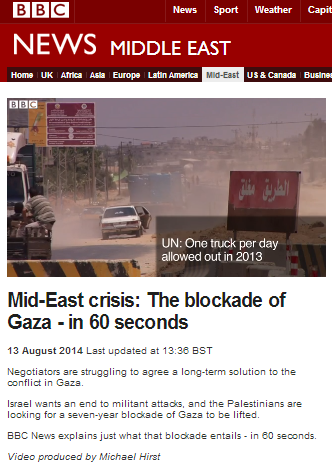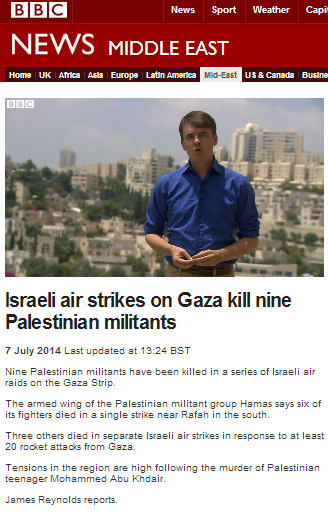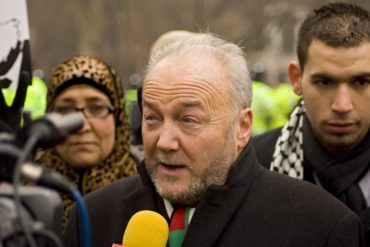A significant proportion of the BBC’s Middle East coverage during the first few months of 2014 was devoted to the topic of the negotiations between Israel and the PLO which had commenced at the end of July the previous year and were scheduled to run until the end of April.
As we know, those talks collapsed shortly before their deadline arrived due to the PA’s decision to form a unity government with Hamas but, as The Tower reports, Roger Cohen of the New York Times has now published an interview with Israel’s chief negotiator Tsipi Livni which provides further background and insight into the lead up to the end of that round of negotiations.
“On March 17, in a meeting in Washington, President Obama presented Mahmoud Abbas, the Palestinian leader, with a long-awaited American framework for an agreement that set out the administration’s views on major issues, including borders, security, settlements, Palestinian refugees and Jerusalem.
Livni considered it a fair framework, and Netanyahu had indicated willingness to proceed on the basis of it while saying he had reservations. But Abbas declined to give an answer in what his senior negotiator, Saeb Erekat, later described as a “difficult” meeting with Obama. Abbas remained evasive on the framework, which was never made public.”
The BBC’s reporting of that meeting was discussed here and here.
Despite Abbas’ stance, negotiations continued but by March 26th the BBC was setting the scene for their collapse, which it explained as follows:
“A dispute over the release of a fourth batch of Palestinian prisoners from Israeli jails threatens to derail his [Kerry’s] plan to continue talks beyond 29 April.”
Similar portrayal of the issue was also broadcast on BBC radio.
The Tower continues:
“Cohen writes that on April 1, the Israeli government had prepared a statement promising further prisoner releases and an agreement to negotiate past the April 29 deadline, with a commitment to slow down or freeze the building of Israeli settlements.”
A BBC report from that time continued to fail to clarify to audiences the issues behind the delayed prisoner release. Cohen’s article goes on to state:
“Then, Livni said, she looked up at a television as she awaited a cabinet meeting and saw Abbas signing letters as part of a process to join 15 international agencies — something he had said he would not do before the deadline.
She called Erekat and told him to stop the Palestinian move. He texted her the next day to say he couldn’t. They met on April 3. Livni asked why Abbas had done it. Erekat said the Palestinians thought Israel was stalling. A top Livni aide, Tal Becker, wrote a single word on a piece of paper and pushed it across the table to her: “Tragedy.””
The BBC’s report of that April 1st unilateral move failed to inform audiences that the Palestinians had committed to refraining from just such an action in the pre-negotiation agreements and subsequent reports on April 3rd and April 4th were characterized by the same omission, as was the one published on April 6th and the one published on April 9th. By April 11th the BBC was openly attributing the floundering state of the negotiations to Israeli actions.
The final nail in the coffin of negotiations came a few days later:
“Talks limped on around the idea of a settlement freeze and other confidence-building measures. Then, on April 23, a reconciliation was announced between Hamas and Abbas’s Fatah — something since proved empty. That, for Netanyahu and Livni, was the end: They were not prepared to engage, even indirectly, with Hamas.” […]
“Livni met Abbas in London on May 15. ‘I said to him, the choice is not between everything and nothing. And your choice in the end was to get nothing’.”
BBC reporting of that PA move failed to clarify its significance to audiences whilst both continuing to attribute the failure of negotiations to Israel and to amplify PA propaganda blaming Israel for the collapse of talks.
When the official deadline for the end of negotiations arrived on April 29th, BBC reporting on the topic was taken over by its Middle East editor. Jeremy Bowen produced a series of reports – see here, here, here and here – which framed the issue in terms of Israel having broken off negotiations. That simplistic messaging was repeated in other BBC articles – see examples here and here. As was noted here at the time:
“So once again we see that the BBC’s dumbed-down take-away message to its audiences is that the negotiations […] were ended by Israel, with no mention of any other contributing factors or context. That apparently well entrenched editorial policy very clearly points audiences towards the adoption of a view of the issue according to which Israel is the rejectionist which spoiled the peace party for everyone else.”
As Roger Cohen’s interview with Tsipi Livni shows, the Palestinian Authority made three important choices between March 17th and April 23rd (not to accept the American framework, to join international agencies in breach of existing commitments and to opt for reconciliation with Hamas) which had a crucial effect on the fate of the negotiations. Eight months on, however, BBC audiences have still not been properly informed as to why those negotiations collapsed and what part the Palestinian Authority played in that failure. Moreover, the BBC’s inaccurate version of events joins its archive material as ‘historical record‘ and hence will continue to mislead the public in years to come.




